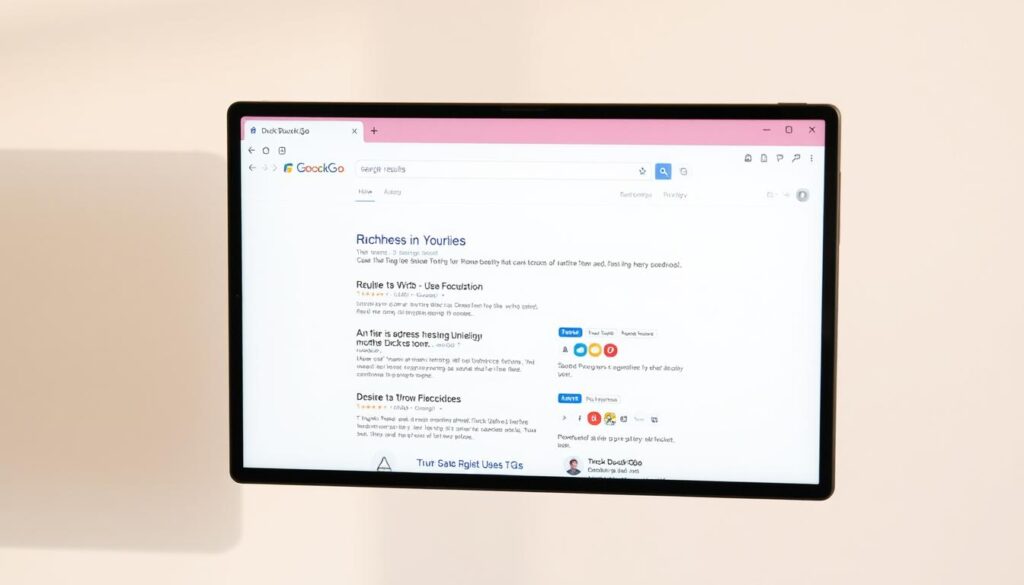In a world where online privacy feels rare, DuckDuckGo stands out as a trustworthy alternative to mainstream options. Launched in 2008 by Gabriel Weinberg, this Pennsylvania-based platform prioritizes user anonymity. Unlike traditional tools, it doesn’t track your activity, store personal details, or filter results based on your history.
What makes DuckDuckGo unique? It delivers unbiased answers while blocking hidden trackers that follow you across the web. Every query is handled with strict privacy protocols, ensuring your data stays yours. Whether you’re researching sensitive topics or just browsing, the platform shields your digital footprint.
This article explores how DuckDuckGo works, its growth from a niche project to a global name, and features like !bangs for faster searches. You’ll also learn why its transparent policies make it a leader in data protection. Ready to see how it stacks up against competitors? Let’s dive in.
Key Takeaways
- DuckDuckGo prioritizes user privacy by avoiding data collection or tracking.
- Founded in 2008, it offers unbiased results without personalized filters.
- The platform operates from Pennsylvania and serves users globally.
- Advanced features like instant answers and shortcuts improve search efficiency.
- Transparency in operations sets it apart from other engines.
Introduction to DuckDuckGo and Its Privacy Mission
Imagine browsing the web without leaving a digital trail. DuckDuckGo was built on this simple idea: your online activity shouldn’t be monitored or monetized. Since day one, its creators focused on delivering answers without compromising personal information. This approach reshapes how we interact with the internet, putting control back in users’ hands.
Privacy as a Foundation, Not an Add-On
Traditional platforms often treat privacy like an optional feature. DuckDuckGo flips this model by making anonymity the default. It never stores IP addresses, cookies, or search history—ensuring every query remains disconnected from your identity. This contrasts sharply with engines that build detailed profiles to tailor ads or results.
Why Americans Care About Search Privacy
In the U.S., debates about digital rights and data breaches dominate headlines. Over 70% of Americans worry about how companies use their information, according to recent surveys. DuckDuckGo’s no-tracking policy addresses these fears by offering clear, unfiltered results free from hidden influencers.
| Feature | DuckDuckGo | Typical Engines |
|---|---|---|
| User Tracking | None | Extensive |
| Personal Data Storage | Zero | Indefinite |
| Ad Network Ties | Independent | Integrated |
This independence matters for sensitive tasks like medical research or news verification. Later sections will explore how DuckDuckGo’s technical safeguards turn these principles into daily protections. For now, remember: true privacy starts with choices that respect your right to stay invisible.
Understanding the ddg search engine
Ever wondered how some platforms show you exactly what you want to see? DuckDuckGo takes a different route. It combines data from 400+ sources—including partnerships with major providers and its own web crawler—to create balanced search results free from personal bias.

Building Answers Without Tracking You
Unlike services that prioritize profiles based on your history, this platform skips the tracking playbook. By mixing third-party APIs with independent crawling tech, it avoids the “filter bubble” effect. Your queries trigger fresh scans of the web, not recycled predictions from stored data.
Transparency You Can See
Here’s what sets it apart:
| Feature | DuckDuckGo | Competitors |
|---|---|---|
| Result Customization | Location-only | Personal history + behavior |
| Data Retention | Zero logs | Permanent profiles |
| Revenue Model | Non-targeted ads | User data monetization |
Innovations like !Bang shortcuts (try !a amazon) and instant answers save time without compromising principles. Open-source components let tech experts verify its privacy claims firsthand.
Whether you’re checking headlines or researching vaccines, you’ll get the same neutral results as everyone else. No hidden agendas, no shadow profiles—just answers designed to inform, not influence.
History and Growth: From Inception to Modern Times
Gabriel Weinberg’s garage project turned heads in 2008 when he launched a privacy-first alternative to data-hungry platforms. Starting as a solo venture, DuckDuckGo’s early years relied on Weinberg’s savings and determination to prove anonymous browsing could thrive. By 2011, Union Square Ventures recognized its potential, fueling expansion with their first major investment.
Founding Story and Early Years
The platform’s traffic grew quietly but steadily, hitting 1 million daily queries by 2012. Early adopters loved its clean interface and “no tricks” approach. A 2014 integration with Mozilla Firefox brought mainstream attention, tripling users in 18 months. By 2020, daily searches surpassed 100 million—proof that privacy concerns weren’t just niche worries.
Key Milestones and Partnerships Over the Years
Strategic alliances shaped DuckDuckGo’s reach. Apple added it as a Safari option in 2014, while Microsoft’s Bing partnership improved search results accuracy. The 2018 release of mobile apps and browser extensions let users block trackers across devices. Despite adding features like instant answers and news filters, its core promise stayed unchanged.
| Year | Milestone | Impact |
|---|---|---|
| 2011 | Union Square Ventures Investment | Accelerated tech development |
| 2014 | Firefox Default Option | User base tripled |
| 2018 | Browser Extension Launch | Expanded privacy tools |
| 2020 | 100M+ Daily Searches | Established market relevance |
Revenue grew through discreet ads and affiliate links—never compromising user anonymity. As Weinberg noted: “We build trust by having nothing to sell but the service itself.” Today, DuckDuckGo stands as a testament to principled growth in the data-driven web era.
Privacy Features and Benefits
Your digital privacy deserves more than just promises. DuckDuckGo delivers concrete protections through features built directly into every query. Unlike platforms that collect mountains of personal information, this service operates on a simple principle: your business stays your business.
Data Protection and Anonymity Measures
Every search starts with HTTPS encryption, shielding your activity from prying eyes. The platform strips identifying details like IP addresses before processing requests. Third-party trackers and cookies get blocked automatically—no hidden data collectors here.

User profiles don’t exist in DuckDuckGo’s world. Your search history vanishes like footprints in sand, leaving nothing to sell or share. This approach prevents the “filter bubble” effect common in other tools.
Limitations and Best Practices for Maximum Security
While DuckDuckGo guards your searches, clicked links can reveal referral data to external sites. Local storage might temporarily cache non-sensitive info—like dark mode preferences—but never login details or location markers.
| Privacy Aspect | DuckDuckGo | Other Platforms |
|---|---|---|
| Search Tracking | None | Comprehensive |
| Ad Personalization | Zero | Behavior-based |
| Data Sharing | Never | Frequent |
Boost your anonymity with these tips:
- Pair searches with a reliable VPN to mask your IP address
- Use private browsing modes across devices
- Regularly clear browser cookies and cache
Remember: total internet privacy requires layered defenses. DuckDuckGo handles the heavy lifting—you handle the finishing touches.
Advanced Features and Search Operators
Think of DuckDuckGo as your digital Swiss Army knife. Beyond basic queries, it offers tools that streamline how you find information while keeping your activity private. These features work quietly in the background, turning complex tasks into simple keystrokes.

Instant Answers and !Bang Commands
Type “weather 90210” and watch the forecast appear instantly—no clicking needed. This Zero-Click Info feature pulls data from trusted sources like Wikipedia and Wolfram Alpha. Need faster access to specific sites? Try !bang commands:
- !w pizza → Wikipedia’s pizza entry
- !yt jazz playlists → YouTube results
- !a hiking boots → Amazon product page
Over 13,000 shortcuts let you bypass search results entirely. It’s like having direct dial numbers for your favorite online services.
Precision Searching Across Formats
Refine queries using special operators that work like laser pointers:
| Operator | Use Case |
|---|---|
| filetype:pdf | Finds research papers |
| site:nytimes.com | Searches one website |
| -coupon | Excludes unwanted terms |
Want only recent updates? Add “date:2024” to your query. For visual searches, use the image tab with color filters or size limits. Video and news tabs sort content by recency without tracking your preferences.
These tools prove that powerful searching doesn’t require personal data collection. As one user noted: “It’s like having a librarian who remembers everything—except your name.”
Integrating DDG with Tools, Extensions, and Proxies
Unlock DuckDuckGo’s full potential by connecting it to your favorite tools. Whether you’re a developer scraping data or a privacy-conscious user, these integrations streamline workflows while keeping your activity anonymous.

Command-Line Power for Custom Projects
Tech-savvy users love DuckDuckGo’s CLI tools. Install the ddg package via pip to run searches directly from your terminal:
pip install ddgSearch for images, videos, or articles with simple commands like ddg text “best hiking trails”. Developers can use the DDGS Python class to fetch results programmatically—perfect for building custom dashboards or research tools.
Proxy Setup for Ironclad Anonymity
Boost privacy by routing queries through proxies. Pair DuckDuckGo with Tor for multi-layered protection:
ddg text "climate change news" --proxy socks5://localhost:9050Rotating proxies prevent IP-based tracking during extended research sessions. Browser extensions like Privacy Essentials add one-click access to DuckDuckGo’s features across Chrome and Firefox.
| Tool | Use Case | Privacy Benefit |
|---|---|---|
| Tor | High-risk research | Multi-hop encryption |
| Rotating Proxies | Data scraping | IP address masking |
| Browser Extensions | Daily browsing | Tracker blocking |
Stuck? Clear your cache if proxies time out, and verify network settings with curl tests. For maximum security, combine these tools with a no-logs VPN—your digital footprint becomes virtually untraceable.
Conclusion
Choosing a search tool shouldn’t mean sacrificing privacy or settling for biased results. DuckDuckGo proves that anonymity and quality can coexist online. From its 2008 garage beginnings to serving millions globally, this platform has redefined what a privacy-first experience looks like.
Unlike mainstream options that track your every move, DuckDuckGo delivers unfiltered answers while blocking hidden trackers. Features like !Bang shortcuts and instant results simplify tasks without compromising your data. Its transparent policies ensure you’re never treated as a product.
For those needing deeper integration, browser extensions and proxy support create seamless workflows. Whether researching sensitive topics or shopping online, these tools keep your activity confidential across devices.
Ready to break free from data-hungry platforms? DuckDuckGo offers a refreshing alternative where your queries stay private and results remain impartial. Give it a try—your digital footprint will thank you.
